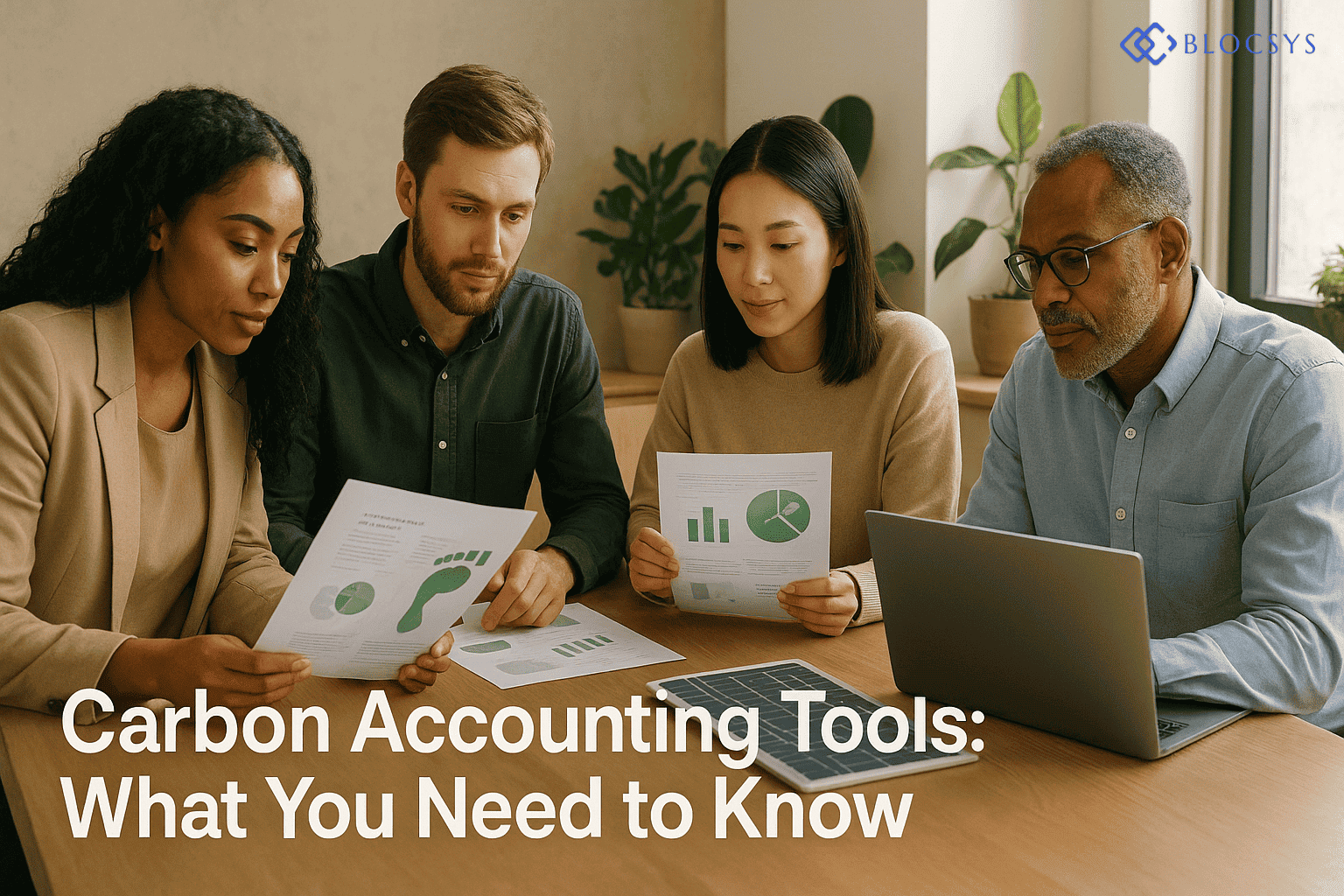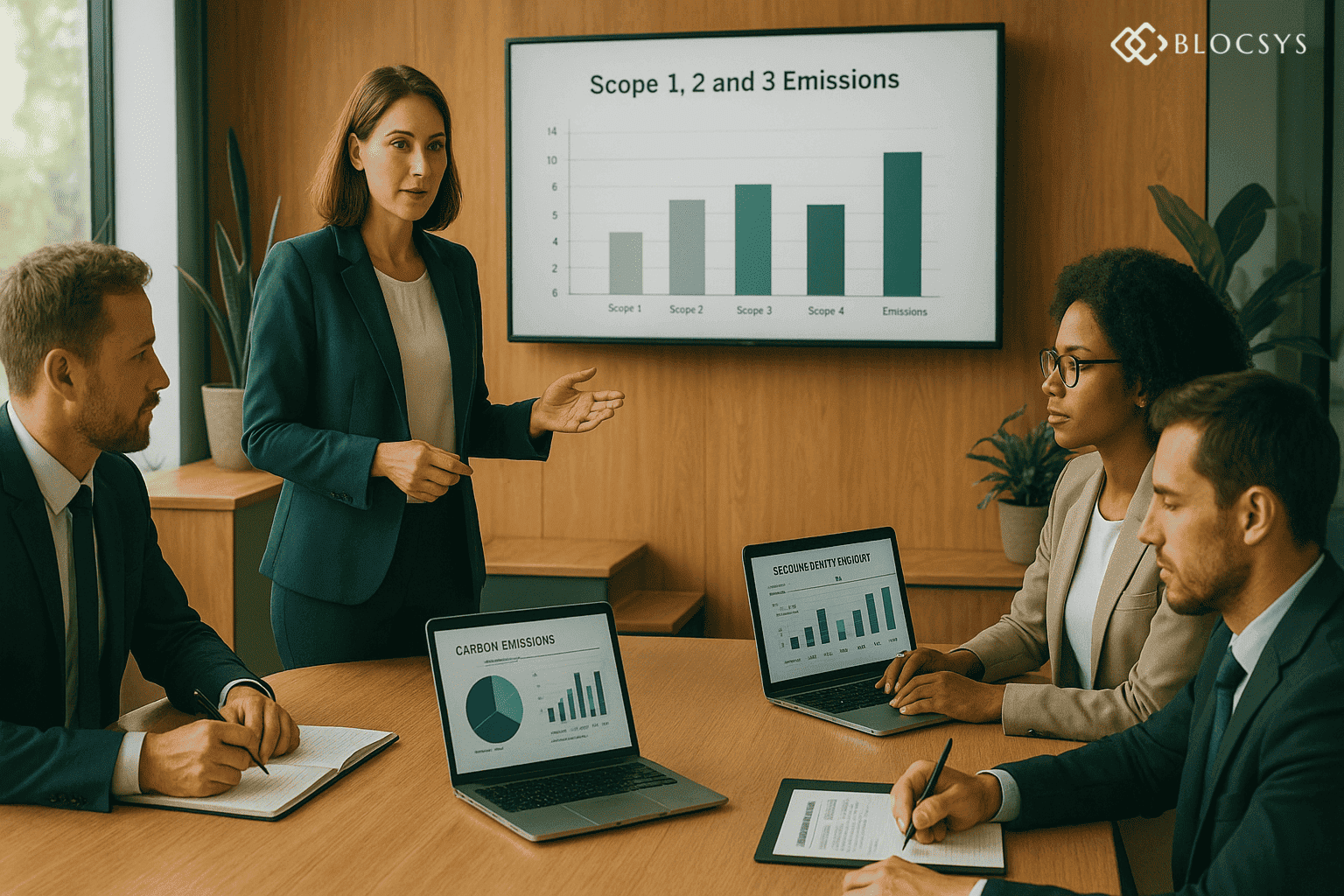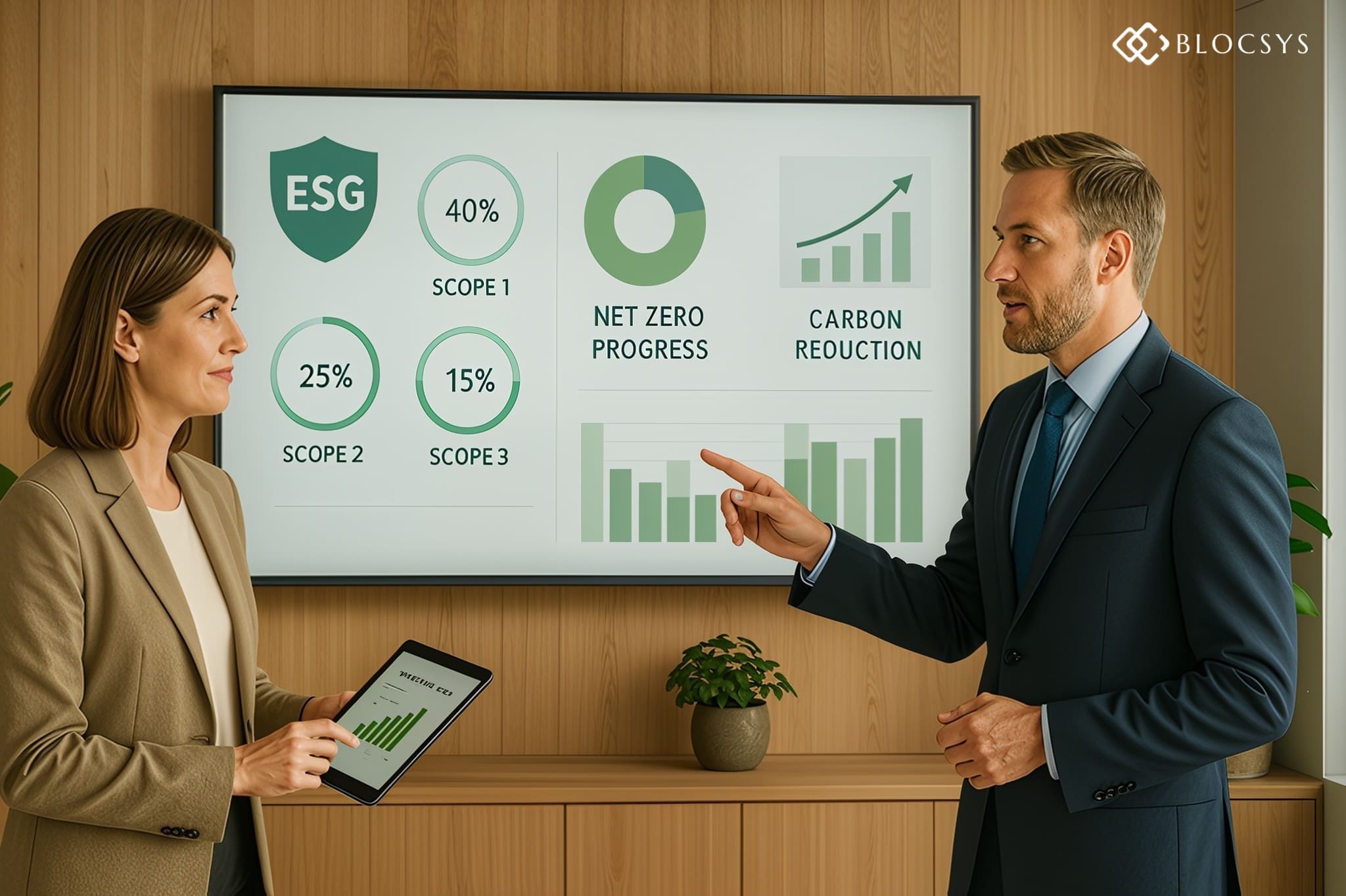As sustainability becomes a crucial aspect of global business strategy, carbon accounting has become progressively more valuable as compared to just reporting obligations. Despite the push for transparency by investors, regulators, and customers, businesses that can measure, manage, or reduce their carbon footprint are now more competitive. Carbon accounting tools can be instrumental in ensuring that business operations are audit-free, regulatory-compliant, and profitable for the long term when used by business owners, SMEs, or investors.
This blog post details the importance of these tools, what to look for, and how Blocsys Technologies is assisting companies in modernizing their existing platforms to thrive in an ESG-driven future
In what ways Carbon Accounting Tools are essential for your businesses?
Today’s market places a strong emphasis on the correlation between business achievement and climate performance. As ESG frameworks have become more prevalent in various countries, including the United States. Companies of all sizes are now responsible for their emissions, thanks to the SEC Climate Disclosure Rule, the EU CSRD, and the UK’s SECR standards.
- Regulatory Compliance.
The enforcement of mandatory Scope 1, 2, and 3 emission disclosures is being carried out by governments in the U.S, UK, and EU. The use of cutting-edge carbon accounting tools enables data collection and ensures compliance with relevant standards such as CSRD, IFRS S2, and GHG Protocol. - Investor Expectations.
Businesses with robust environmental data are being a top priority for venture capital firms and ESG investors. An open-ended carbon tracking platform indicates wholesome governance and sustainable development, increasing valuation and access to capital. - Operational Efficiency & Risk Management.
Besides compliance, carbon accounting tools also aid businesses in identifying inefficiencies and optimizing supply chains to reduce energy costs. Measurable ROI is achieved through data-driven sustainability that converts carbon intelligence into competitive advantage.
How Carbon Accounting Software Works.
Efforts to collect, analyze and report carbon data are made easier by modern emissions management tools.
Step 1: Data Collection.
With the help of Software we get calculation of energy consumption, transportation data, procurement information, and more by connecting directly to ERP systems or other Internet of Things (IoT) sensors, utility APIs, etc.
Step 2: Emission Calculations.
By utilizing verified GHG Protocol emission factors, the platform converts activity data into CO2-equivalents that are accurately defined Scope 1, 2, and 3 emissions.
Step 3: Reporting and Visualization.
Platform Advanced dashboards enable businesses to monitor performance trends, follow reduction targets and produce reports that are ESG-compliant and relevant to regulators (and potential investors).
Step 4: Continuous Optimization.
With the help of using these carbon accounting tools Companies can gain insight into decarbonization strategies by utilizing AI-based analytics, which helps them stay on top of policy changes and investor scrutiny.
Important aspects of proficient Carbon Accounting tools.
The key components of carbon accounting software to consider when evaluating:
- Integrating data from ERP, CRM and utility systems automatically.
- Coverage 1-3 of the GHG Protocol requirements.
- Real-time dashboards and carbon analytics.
- Regulatory reporting templates for SEC, CSRD, and TCFD.
- Using AI tools, they predict future emissions through planning for reduction.
- The use of blockchain-based audit trails can enhance the data security.
- Custom APIs designed for integration with enterprise systems.
Optimum transparency, scalability, and compliance are essential for startups and global corporations due to these features.
The advantages of Carbon Accounting Tools are numerous.
- Improved compliance and reporting on ESG.
- Reduced manual work through automation.
- Concise insights into carbon footprint to use in making decisions._
- Convincing investor confidence through verified data.’
- Competitive advantage in sustainable markets.
- Real-time emissions reduction tracking.
Digital carbon accounting makes sustainability measurable, actionable and profitable.
The Right Carbon Tracking Platform to Use.
The appropriate carbon tracking platform is determined by the needs of your organization:.
- Saas carbon tools are designed to simplify the onboarding process for startups and SMEs with minimal effort.
- Enterprises with large amounts of ERP, procurement, and logistics data require scalable systems.
- Portfolio-wide emissions visibility is essential for investors and VCs to evaluate sustainability risks.
Interoperability, data accuracy, and regulatory readiness are crucial factors for long-term value creation when faced with uncertainty.
Blocsys Technologies Accelerates Future Carbon Accounting Platforms.
Blocsys Technologies is aiding businesses, investors, and innovators in establishing the digital infrastructure necessary for a sustainable future, despite the current ESG landscape.It specialises in custom carbon accounting platforms, blending AI with data engineering to build intelligent secure and compliant carbon management systems.
At Blocsys, developers have experience for development of carbon accounting platforms while following industry standards and compliances.
Blocsys Technologie offers Features and Services.
- Carbon Accounting Platform Development: End-to-end software for corporate emissions monitoring, calculation, and reporting.
- The use of machine learning models in predictive analytics enables the prediction of emissions, identification of irregularities, and optimization of reduction strategies.
- Ready-to–deploy ready ESG and compliance dashboards conform to SEC, CSRD and GHG Protocol standards.
- API and system integration: Easy to use integration with ERP, IoT, and finance systems for instant data management.
- White-label and enterprise-grade sustainability platforms for startups and global corporations. Custom SaaS Solutions.
- By enabling organizations to switch from manual carbon tracking to intelligent automation, Blocsys Technologies can improve sustainability performance, compliance, and investor confidence.
Frequently Asked Questions (FAQ)
1.What’s carbon accounting software?
Ans.Many Companies are using carbon accounting software to electronically measure, track, and report greenhouse gas emissions (Scope 1, 2,and 3).
2.What makes carbon accounting a crucial aspect of the business model?
Ans.The implementation of environmental regulations, increased operational efficiency and investor confidence through sustainability performance demonstration is also encouraged.
3.How can industries benefit from the implementation of carbon accounting software?
Ans.Industries like Manufacturing, logistics, energy, retail, finance, and tech companies all have a role to play in emissions tracking and ESG performance.
4.Can you explain the process of carbon platform development by Blocsys Technologies?
Ans.Blocsys Technologies designs and builds bespoke carbon accounting platforms using artificial intelligence to help companies automate tracking of emissions while maintaining compliance and meeting sustainability targets.
Conclusion
The global business community is entering the era of climate accountability and carbon accounting tools are the foundation. Many companies situated in the USA, UK, Germany, France, and beyond, are currently investing in reliable carbon software which is no longer an optional need to these companies.
By leveraging the innovative solutions developed by Blocsys Technologies, businesses can simplify compliance, gain operational clarity, and demonstrate leadership in the transition to a net-zero economy.
Carbon accounting isn’t just about measuring emissions, it’s about measuring progress



